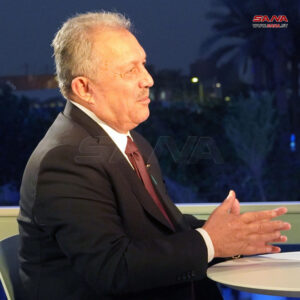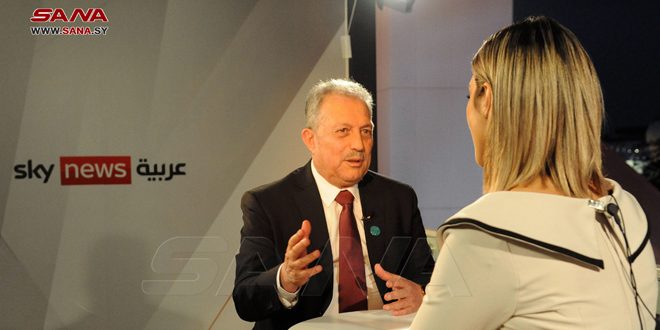Arnous to Sky News Arabia: Unfair unilateral coercive measures imposed on Syria have badly affected the environment
Prime Minister Hussein Arnous, who is leading the Syrian delegation to the World Climate Action Summit (COP28) in the UAE, has stressed that the unfair unilateral coercive measures imposed on Syria have badly affected all walks of the life in the country, including the climate and the environment.
Interviewed by Sky News Arabic on Friday, Arnous said that decreasing the impacts of drought, supporting transformation to modern irrigation, depending on renewable energy sources and reducing the emission of harmful gases are among the priorities of the Syrian government’s work.
“We in Syria, like in any other country, are concerned about climate change, which poses a threat to the world. Collective measures must be taken, each country according to its capabilities, whether in mitigating climate damage or adapting to climate change,” Arnous went on to say.
He explained: “Syria was one of the first countries to sign the climate agreement in 2007. It also officially joined and signed the Paris Agreement, worked by all means and methods in accordance with the established programs and made great strides in the mitigation and adaptation processes by the transition to modern irrigation in agriculture”.
He added that sustainability in agriculture and the transition to renewable energy are proceeding at an increasing pace, like all economic activities in Syria, which are growing significantly. Moreover, he pointed out, Syria has worked to mitigate the impacts, which is proven by facts and implementation rates.
The Prime Minister made it clear that Syria has faced a brutal war that affected all walks of life, including the environment, as several facilities that were built with the aim of mitigating the environmental impacts, including water stations and the projects for transition to modern irrigation, have been exposed to vandalism, theft and destruction that put them completely out of service.
He said that part of Syria’s natural resources is being stolen by the occupation under the sight of the entire world and part of the stolen oil is being refined through using bad and primitive methods that leave major negative impacts on the environment, the people of the region, agricultural lands and water.
 He also said that the lack of oil derivatives, due to thefts and blockade has add pressure on the forests, as many people resorted to the forests to secure their needs of Firewood so as to keep warm in winter.
He also said that the lack of oil derivatives, due to thefts and blockade has add pressure on the forests, as many people resorted to the forests to secure their needs of Firewood so as to keep warm in winter.
Arnous illustrated that “before the terrorist war, Syria used to produce 5 million tons of wheat. Its annual need was 2 and a half million tons and it used to export wheat and help other countries with this strategic crop. This was possible as the state spent hundreds of billions of dollars in land reclamation and the construction of irrigation canals and dams. However, the situation has become completely different, as, today, due to the terrorist war, the state is only able to obtain approximately 1 million tons of wheat and it imports 1 and a half million tons to secure its need”.
He pointed out that climate changes have also affected production. Rain-fed lands used to produce 30 percent of wheat, and in recent years these lands have become out of service due to climate conditions and lack of rain. Also, the upstream country of the Euphrates River allows the flow of no more than 50% of the quota allocated for Syria and Iraq according to international agreements, and therefore all these factors affect agricultural production, he added.
Arnous indicated that these challenges greatly affect investment and reconstruction in the country, therefore, Syria, calls for lifting the unjust Western coercive measures because they prevent the implementation of projects and obstruct the work of international organizations that want to help the Syrian government in some climate issues.
He pointed out that the Israeli enemy deprives the people in the occupied Syrian Golan of their right to their water and steals it and it buries dangerous waste in Syrian lands, and this deprives Syrian citizens of their rights to this wealth within their lands.
Arnous hailed the initiative made by President of the United Arab Emirates, Sheikh Mohammed bin Zayed Al Nahyan, during the 28th Conference of the Parties to the United Nations Framework Convention on Climate Change (COP28), which aims at creating a global climate solutions fund.
He stressed that Syria is working with all countries and organizations to mitigate the effects of climate change, and the Syrian government delegation is present at the “COP28” conference to participate in all its activities and exchange experiences and discuss possible solutions to help overcome the difficulties produced by climate changes.
Hamda Mustafa

